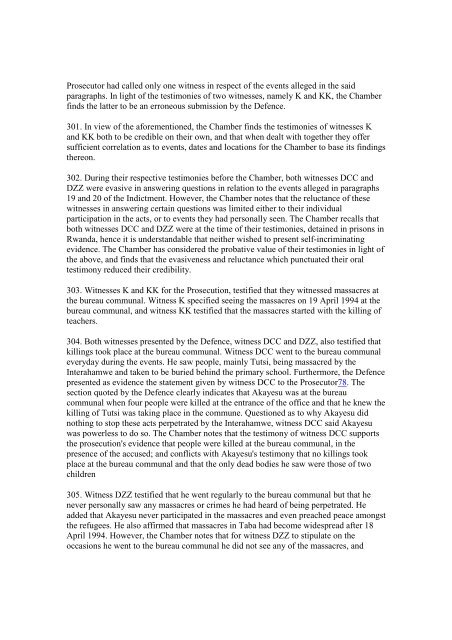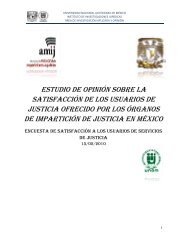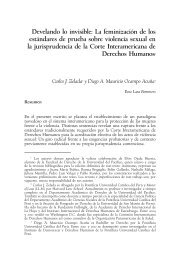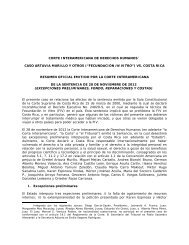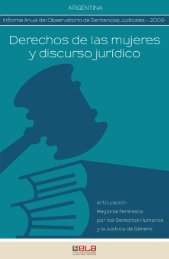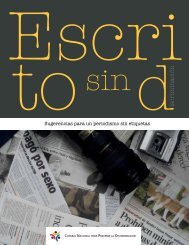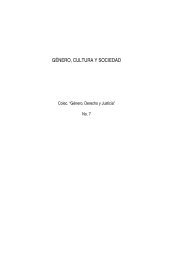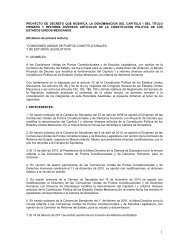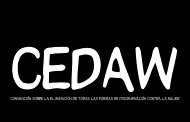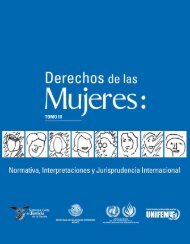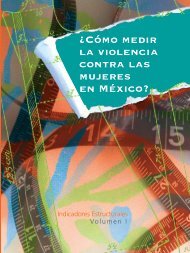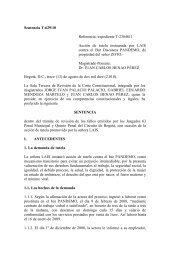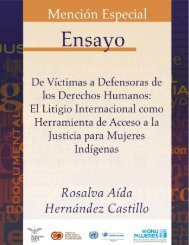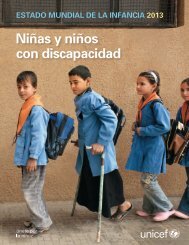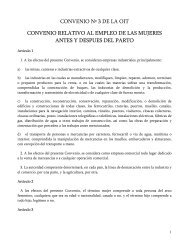Prosecutor had called only one witness in respect of the events alleged in the saidparagraphs. In light of the testimonies of two witnesses, namely K and KK, the Chamberfinds the latter to be an erroneous submission by the Defence.301. In view of the a<strong>for</strong>ementioned, the Chamber finds the testimonies of witnesses Kand KK both to be credible on their own, and that when dealt with together they offersufficient correlation as to events, dates and locations <strong>for</strong> the Chamber to base its findingsthereon.302. During their respective testimonies be<strong>for</strong>e the Chamber, both witnesses DCC andDZZ were evasive in answering questions in relation to the events alleged in paragraphs19 and 20 of the Indictment. However, the Chamber notes that the reluctance of thesewitnesses in answering certain questions was limited either to their individualparticipation in the acts, or to events they had personally seen. The Chamber recalls thatboth witnesses DCC and DZZ were at the time of their testimonies, detained in prisons in<strong>Rwanda</strong>, hence it is understandable that neither wished to present self-incriminatingevidence. The Chamber has considered the probative value of their testimonies in light ofthe above, and finds that the evasiveness and reluctance which punctuated their oraltestimony reduced their credibility.303. Witnesses K and KK <strong>for</strong> the Prosecution, testified that they witnessed massacres atthe bureau communal. Witness K specified seeing the massacres on 19 April 1994 at thebureau communal, and witness KK testified that the massacres started with the killing ofteachers.304. Both witnesses presented by the Defence, witness DCC and DZZ, also testified thatkillings took place at the bureau communal. Witness DCC went to the bureau communaleveryday during the events. He saw people, mainly Tutsi, being massacred by theInterahamwe and taken to be buried behind the primary school. Furthermore, the Defencepresented as evidence the statement given by witness DCC to the Prosecutor78. Thesection quoted by the Defence clearly indicates that Akayesu was at the bureaucommunal when four people were killed at the entrance of the office and that he knew thekilling of Tutsi was taking place in the commune. Questioned as to why Akayesu didnothing to stop these acts perpetrated by the Interahamwe, witness DCC said Akayesuwas powerless to do so. The Chamber notes that the testimony of witness DCC supportsthe prosecution's evidence that people were killed at the bureau communal, in thepresence of the accused; and conflicts with Akayesu's testimony that no killings tookplace at the bureau communal and that the only dead bodies he saw were those of twochildren305. Witness DZZ testified that he went regularly to the bureau communal but that henever personally saw any massacres or crimes he had heard of being perpetrated. Headded that Akayesu never participated in the massacres and even preached peace amongstthe refugees. He also affirmed that massacres in Taba had become widespread after 18April 1994. However, the Chamber notes that <strong>for</strong> witness DZZ to stipulate on theoccasions he went to the bureau communal he did not see any of the massacres, and
further that he had not heard of Akayesu's participation in massacres, does not refute thespecific allegations in paragraphs 19 and 20. Indeed, it is alleged killings occurred at thebureau communal in the presence and under the instructions of Akayesu. DZZ had heardthere were massacres at the bureau communal but never personally witnessed any. TheChamber notes thereon that the defence presented by the testimony of witness DZZsupports the fact that there were massacres at the bureau communal but that it does notspecifically address the events in the said paragraphs, as the witness was not presentwhen the killings he had heard of took place.306. Akayesu admitted during his examination-in-chief that he saw massacres of refugeesat the bureau communal on 19 April 1994. This is corroborated by the testimonies ofwitnesses DZZ, DCC, K and KK in relation to there being massacres at the bureaucommunal. The Chamber finds it has been proved beyond reasonable doubt that, firstly,there were refugees at the bureau communal and, secondly, that massacres did occur atthe bureau communal on or about 19 April 1994.307. Akayesu confirmed under cross-examination that he was able to identifyintellectuals, teachers being an example he put to the Chamber, from the rest of therefugees. Witnesses K and KK both stated that Akayesu ordered the killing of certainintellectuals and other refugees. The Defence did not specifically address theseallegations. Under cross-examination, questioned as to these allegations, Akayesu said henever saw anyone killed in the courtyard with a machete because he was attending towitness K, that he never saw any bodies inside or outside the courtyard of the bureaucommunal and that he heard of the deaths of the teachers three days after their killings.The Chamber finds that the veracity of these answers can be doubted. Indeed, Akayesuaffirmed himself during his examination-in-chief that, on 19 April 1994, he saw refugeesbeing attacked at the bureau communal, and that he saw some killed and others escape.Further, the Chamber finds implausible the assertion that he heard of the deaths of theRemera teachers three days later. Witnesses, including himself, have placed Akayesu atthe bureau communal on 19 April 1994. Akayesu testified to seeing and hearing ofsearches of various intellectuals in Taba throughout the day of 19 April 1994, yet hesomehow did not hear of killings that took place at the bureau communal the same day.The Chamber cannot accept Akayesu's assertion with regard to the killing of teachers.Further, the Chamber notes that Akayesu did not specifically contest the allegations thathe ordered the militia and local population to kill intellectuals and influential people.Paragraph 19308. As pertains to the allegations in paragraph 19, evidence set out above hasdemonstrated that refugees from Runda had been held at the bureau communal byAkayesu. Evidence has established that Akayesu told the Interahamwe he had sent <strong>for</strong>that "[...] he could no longer have pity <strong>for</strong> the Tutsi. Even those who we have kept here, Iwant to deliver them to you so that you can render a judgment unto them". It has beendemonstrated that he then ordered the release of the refugees and handed them over to theInterahamwe with the words here they are'. Evidence has demonstrated that theserefugees were made to sit next to the fence of the bureau communal and that when they
- Page 2 and 3:
1.2. The Indictment1.3. Jurisdictio
- Page 4 and 5:
eports2 which indicated that acts o
- Page 6 and 7:
3. Jean Paul AKAYESU, born in 1953
- Page 8 and 9:
16. Jean Paul AKAYESU, on or about
- Page 10 and 11:
Counts 7-8(Crimes Against Humanity)
- Page 12 and 13:
c) Deliberately inflicting on the g
- Page 14 and 15:
1.4. The Trial1.4.1. Procedural Bac
- Page 16 and 17:
y the opening statement for the Def
- Page 18 and 19:
y the Tribunal for crimes related t
- Page 20 and 21:
38. Regarding the Gishyeshye meetin
- Page 22 and 23:
witness was lying because he or she
- Page 24 and 25:
in the commune. His de facto author
- Page 26 and 27:
70. Apart from asking the prefect t
- Page 28 and 29:
84. According to the testimony of D
- Page 30: Scores of political leaders were im
- Page 33 and 34: his listeners to avoid the error of
- Page 35 and 36: 111. The killing of Tutsi which hen
- Page 37 and 38: killed on the grounds that the foet
- Page 39 and 40: 128. In conclusion, it should be st
- Page 41 and 42: Witness statements137. During the t
- Page 43 and 44: protection of witnesses issued by t
- Page 45 and 46: covered anyone who had anti-Tutsi t
- Page 47 and 48: Tutsi and the Tutsi were accused of
- Page 49 and 50: as "two armies", "two belligerents"
- Page 51 and 52: "The primary criterion for [definin
- Page 53 and 54: 180. Many witnesses testified regar
- Page 55 and 56: stated in that Decision, it did not
- Page 57 and 58: deeds. For these reasons, the Chamb
- Page 59 and 60: Concerning the allegation that at l
- Page 61 and 62: turned over alive to Akayesu, and t
- Page 63 and 64: younger brothers. He stated that he
- Page 65 and 66: 237. Karangwa testified under cross
- Page 67 and 68: three brothers lie on their stomach
- Page 69 and 70: known as Usuri (phonetic spelling)
- Page 71 and 72: Karangwa's explanation for the inco
- Page 73 and 74: Count 3, Crimes against Humanity (e
- Page 75 and 76: those killed were professors from R
- Page 77 and 78: 290. Witness DCC for the Defence, d
- Page 79: children, and old people. The Chamb
- Page 83 and 84: to fetch the one who remains', a pr
- Page 85 and 86: sector councillors called on the cr
- Page 87 and 88: According to witness A, the bourgme
- Page 89 and 90: present took it to mean that the Tu
- Page 91 and 92: 355. The Accused himself confirmed
- Page 93 and 94: 364. Paragraph 15 of the Indictment
- Page 95 and 96: The witness said a certain Françoi
- Page 97 and 98: has not been proved beyond reasonab
- Page 99 and 100: who had come to his house. He said
- Page 101 and 102: Interahamwe at the entrance, carryi
- Page 103 and 104: ack to the bureau communal and on t
- Page 105 and 106: Victim Y (Witness N), a [68] year o
- Page 107 and 108: which were at times committed by mo
- Page 109 and 110: communal into a forest in the area
- Page 111 and 112: clubbing a young teacher who had be
- Page 113 and 114: 434. Two days after arriving at the
- Page 115 and 116: he went into hiding during the mass
- Page 117 and 118: ureau communal, but he insisted tha
- Page 119 and 120: taken away from the bureau communal
- Page 121 and 122: The Accused himself testified that
- Page 123 and 124: 464. In that case, when the matter
- Page 125 and 126: "A person who planned, instigated,
- Page 127 and 128: involve facilitating the commission
- Page 129 and 130: 493. In accordance with the said pr
- Page 131 and 132:
Deliberately inflicting on the grou
- Page 133 and 134:
y a psychological relationship betw
- Page 135 and 136:
Chamber notes that, as stated above
- Page 137 and 138:
• complicity by procuring means,
- Page 139 and 140:
547. Consequently, where a person i
- Page 141 and 142:
underscoring their commitment to se
- Page 143 and 144:
character134. In fact, the concept
- Page 145 and 146:
575. The definition of crimes again
- Page 147 and 148:
grounds mentioned in Article 3 of t
- Page 149 and 150:
accepted definition of this term in
- Page 151 and 152:
adopted primarily to protect the vi
- Page 153 and 154:
610. Whilst the Chamber is very muc
- Page 155 and 156:
description, namely, what constitut
- Page 157 and 158:
forces to plan and carry out concer
- Page 159 and 160:
635. There is no clear provision on
- Page 161 and 162:
7.2. Count 5 - Crimes against human
- Page 163 and 164:
663. The definition of crimes again
- Page 165 and 166:
677. The Tribunal notes that eviden
- Page 167 and 168:
685. In the light of its factual fi
- Page 169 and 170:
692. The Tribunal finds, under Arti
- Page 171 and 172:
determine, as far as each proven fa
- Page 173 and 174:
the Tutsi in general. Akayesu who h
- Page 175 and 176:
722. As regards the allegations in
- Page 177 and 178:
732. The rape of Tutsi women was sy
- Page 179 and 180:
Chamber finds beyond a reasonable d
- Page 181 and 182:
Footnote 11. Decision: Order for Co
- Page 183 and 184:
Footnote 41. Article 104 of the Loi
- Page 185 and 186:
Footnote 68. Dictionnaire Rwandais-
- Page 187 and 188:
Footnote 103. "Principles of Intern
- Page 189 and 190:
Footnote 134. Secretary General's R
- Page 191:
Footnote 171. See General Legal Fin


